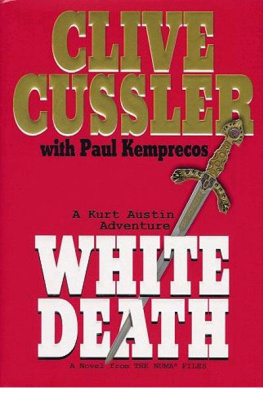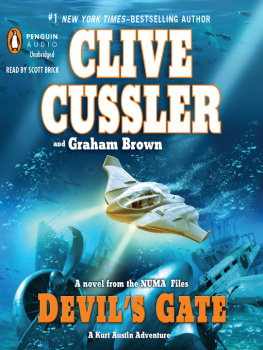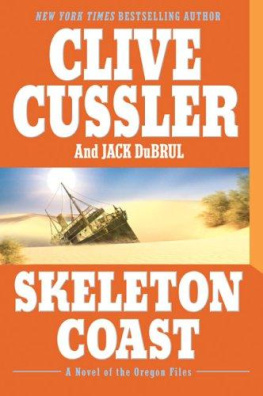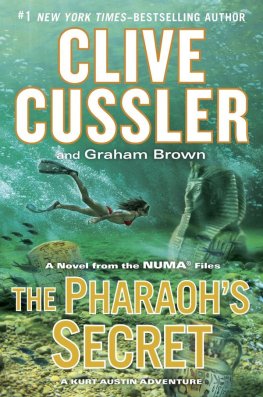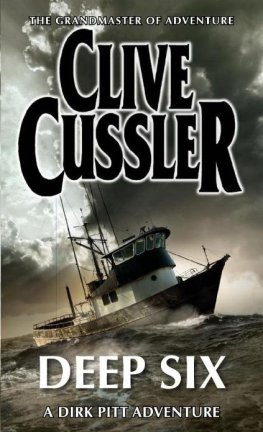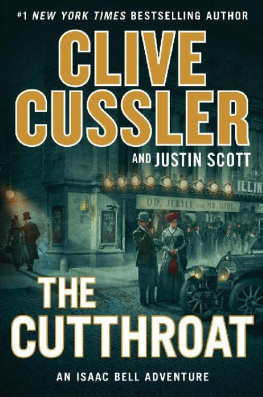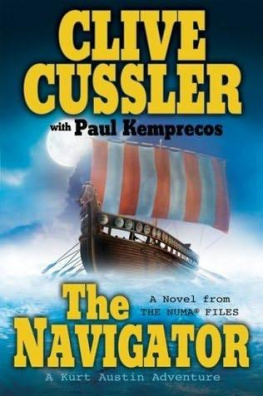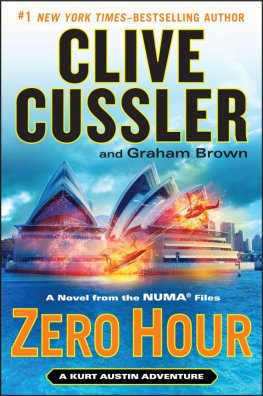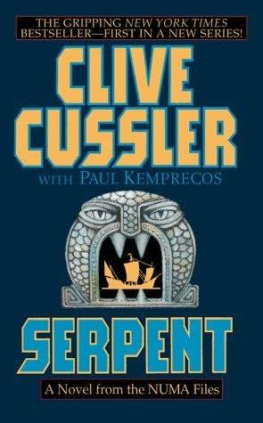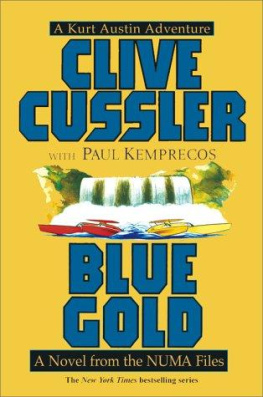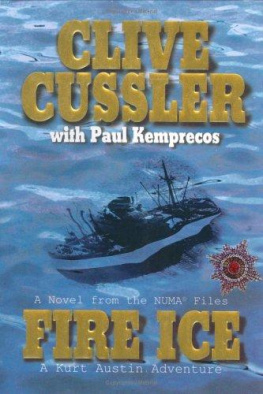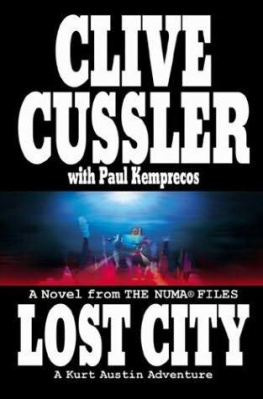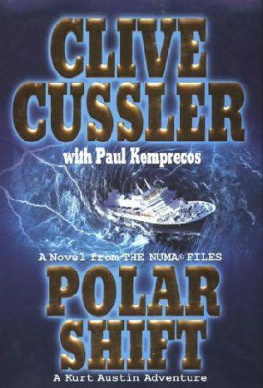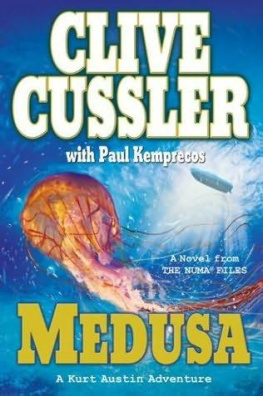7
AUSTIN RECEIVED V IP treatment aboard the research ves- sel. After drinks in the captain's cabin, he enjoyed a delicious meal, then he was entertained with incredible underwater footage of the ship's whale research. He was given a comfortable cabin and slept like a log, and the next morning he said his farewell to Captain Larsen.
The captain seemed sorry to see him go. We're going to be here a few days doing survey work on the cruiser. Let me know if there is anything I can ever do for you or for NUMA.
They shook hands and Austin climbed into the shuttle for the short trip to the Western Harbor. Happy to be on dry land once more after weeks on and under the sea, he made his way along the cob- blestone quay past the line of fishing boats. The capital city of the Faroe Islands was named Torshavn, Thor's Harbor, after the mightiest of the Scandinavian gods. Despite its thundering namesake, Torshavn was a quiet settlement located on a headland between two busy boat harbors.
Austin would have preferred to explore the narrow streets that ran between the colorful old houses, but a glance at his watch told him he had better get moving if he wanted to make the hearing. He dropped his duffel bag off at the hotel room that Becker had arranged for him. He figured he wouldn't be in the Faroes more than another day or so, and decided to leave whether Becker wanted him to or not. On his way out, he asked the desk to book him a flight to Copen- hagen in two days.
His destination was a short walk up the hill toward Vaglio Square in the heart of the city's commercial center. A few minutes later, he stopped in front of an impressive nineteenth-century building built ofdark-hued basalt. The plaque on the exterior identified the struc- ture as the Raohus, or Town Hall. He mentally girded his loins for the ordeal ahead. As an employee of a federal agency, Austin was no stranger to the hazards of navigating governmental seas. The rescue of the men trapped in the LeifErisson might have been the easiest part of his Faroese adventure, he reflected.
The receptionist in the Raohus lobby told Austin how to get to the hearing room. He followed a corridor to a door guarded by a burly policeman and identified himself. The officer told him to wait and slipped into the room. He reappeared a moment later with Becker. Taking Austin by the arm, Becker moved out of earshot.
Good to see you again, Mr. Austin. He glanced at the policeman and lowered his voice. This matter requires a great deal of delicacy. Do you know anything about the Faroe Islands government?
Only that there's an affiliation with Denmark. I don't know the details.
Correct. The Islands are part of the Kingdom of Denmark, but they have had home rule since 1948. They're quite independent, even keeping their own language. However, when they get into financial trouble, they don't hesitate to ask Copenhagen for money, he said, with a faint smile. "This incident occurred in Faroese waters, but a
Danish warship was involved."
Which means SOS wouldn't win any popularity contests in Den- mark.
Becker brushed off his comment with an airy wave. I've made my feelings clear. Those crazy people should be hanged for sinking our ship. But I am a realist. The whole regrettable incident would never have happened if it hadn't been for the Islanders' stubbornness in keeping their old customs.
You mean the whale hunt?
I won't comment on the morality of the grindarap. Many in Den- mark regard the grind as a barbaric and unnecessary ritual. More important are the economic considerations. Companies that might buy Faroese fish or explore for oil don't want the public to think they are doing business with whale murderers. When the Faroese can't pay their bills, Copenhagen must open its pocketbook.
So much for independence.
Becker smiled again. The Danish government wants to resolve this case quickly, with the minimum amount of international pub- licity. We don't want these SOS people seen as courageous martyrs who acted rashly but in defense of helpless creatures.
What do you want from me?
Please go beyond your technical observations in your testimony. We know what sank the cruiser. Feel free to emphasize the human suffering you witnessed. Our goal is to convict Ryan in the court of public opinion, then get these reckless hooligans out of our country and make sure they don't come back. We want to make sure that the world sees them as pariahs rather than martyrs. Perhaps then, some- thing like this won't happen again.
Suppose Ryan is innocent in all this?
His innocence or guilt is of no concern to my government. There are greater issues at stake.
"As you say, a matter of great delicacy. I'll tell your people what I saw. That's all I can promise.
Becker nodded. Fair enough. Shall we go in?
The policeman opened the door, and Becker and Austin stepped inside the hearing room. Austin's eyes swept around the large dark- paneled chamber and took in the suits, presumably government and legal people, who filled several rows of chairs. He was wearing his usual working gear of jeans, turtleneck and windbreaker, having no need on board ship for dressier outfits. More suits sat behind a long wooden table at the front of the room. Sitting in a chair to the right of the table was a man in a uniform. He was speaking in Danish, his words taken down by a stenographer.
Becker indicated a seat, sat next to Austin, and whispered in his ear. That's the representative from the coast guard. You're next.
The coast guard witness concluded a few minutes later, and Austin heard his own name called. Four men and two women sat at the table, with the group evenly divided between Faroese and Danish representatives. The magistrate, an avuncular Dane with a long Viking face, said his name was Lundgren. He explained to Austin that he would ask questions, with the others on the board offering follow-up. This was only an inquiry to collect an informational base, not a trial, he explained, so there would be no cross-examination. He would also translate when necessary.
Austin eased into the chair, and under questioning, offered a straightforward account of the rescue. He didn't have to embellish the suffering or the crew's ordeal in its dark and practically airless tomb. The expression on Becker's face showed that he was pleased with what he heard. Austin stepped down after forty-five minutes, with the thanks of the board. He was anxious to leave, but decided to stay when the court's chairman announced, in Danish and Eng- lish, that the captain of the Sea Sentinel would present his case.
Austin was curious how anyone could defend himself against eye- witness accounts. The door opened and two policemen walked in. Between them was a tall and ruggedly built man in his mid-forties. Austin took in the ginger Captain Ahab chin-fringe, the coifed hair and the gilt-trimmed uniforrri.
The magistrate asked the witness to sit down and introduce him- self.
My name is Marcus Ryan, the man said, his gray eyes making direct contact with those in the audience. I am the executive direc- tor of the Sentinels of the Sea organization and captain of the SOS flagship, the Sea Sentinel. For those who don't know us, SOS is an in- ternational organization dedicated to the preservation of the sea and the marine life that dwells within it.
"Please give the court an account of the events surrounding your collision with the Danish cruiser Leif Eriksson/'
Ryan started into a diatribe against the whale hunt. Speaking in a firm voice, the magistrate asked him to keep his remarks confined to the collision. Ryan apologized and described how the Sea Sentinel had suddenly veered toward the cruiser, striking it.

